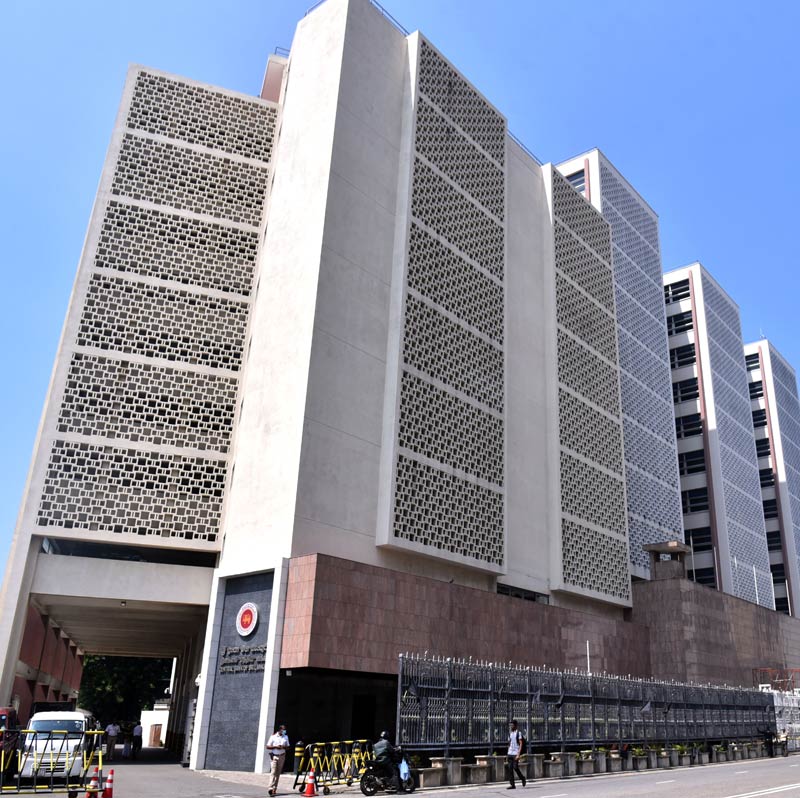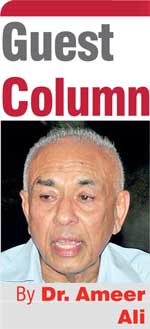Friday Feb 20, 2026
Friday Feb 20, 2026
Friday, 15 March 2024 00:20 - - {{hitsCtrl.values.hits}}

Central Bank of Sri Lanka
 It is difficult to find another instance in the history of central banking where the head of that bank with conscienceless audacity abused the constitutional independence of that institution to raise unilaterally the wages of his staff to such a height, between 36 and 79%, and made them an un-imitable elite of officers to be envied by the rest of the community of public servants. This is one of many and multiplying horror stories one hears almost daily from paradise Sri Lanka.
It is difficult to find another instance in the history of central banking where the head of that bank with conscienceless audacity abused the constitutional independence of that institution to raise unilaterally the wages of his staff to such a height, between 36 and 79%, and made them an un-imitable elite of officers to be envied by the rest of the community of public servants. This is one of many and multiplying horror stories one hears almost daily from paradise Sri Lanka.
At a time when millions of hard-working heads of ordinary families and parents are found skipping meals or eating smaller portions to feed their children, when 30% of five-year-old children are found malnourished, and when the danger of starvation is knocking at the doors of the poorest, the unconscionable act of munificence by the big chief Dr. Nandalal Weerasinghe (NW) fits into the proverbial robbery of Peter to pay Paul. The Central Bank’s notoriety continues unabated.
Between 2006, when an accountant and politician Nivard Cabraal was appointed as CBSL Governor by his own party leader and President of the country Mahinda Rajapaksa, and 2022 when the current chief NW with his sound expertise and experience in monetary policy was appointed by President Gotabaya Rajapaksa (GR), the reputation of CBSL had suffered immeasurably. The $ 200 million loss over the Greek Bond fiasco under Cabraal, the scandalous bond scam under Arjuna Mahendran and overlooked by the current President Ranil Wickremesinghe (RW) who was the Prime Minister then, the surrender of CBSL’s constitutional independence to the economic whims and fancies of GR during the Governorship of W.D. Lakshman, and the second reign of Cabraal which was marked more for his avaricious struggle to receive a fat pension and cabinet position than to tighten monetary controls and bring down the escalating inflation, are some of the unfortunate developments which contributed to CBSL’s disrepute and consequent bankruptcy of national treasury and collapse of the economy.
The Governorship of NW coincided with the forced resignation of GR and his replacement by the unelected RW, and more importantly with the entry of IMF to repair the national bankruptcy. The new governor to his credit already had the experience of working with IMF in Washington as one of its alternative Executive Directors between 2010 and 2012. It was therefore fortunate that IMF found the most suitable person as the head of CBSL who would implement the IMF agenda in full. As expected, the route to recovery began with measures to stabilise and restructure the country’s finance sector.
Sri Lanka being a debtor nation and IMF being the super watchdog of the international financial system, one of IMF’s supplementary objectives was to stabilise Sri Lanka’s financial sector so that the country could strengthen its currency, reduce the escalating inflation rate and accumulate enough hard currency to meet its debt obligation to foreign creditors. But when those creditors insisted that the cost of debt restructuring should also be shared by domestic financial institutions NW readily complied but deliberately excluded the banking sector from that exercise while shifting the entire cost of domestic debt restructuring to saving institutions like EPF and ETF. In other words, while he spared the rich the poor were forced to carry the burden.
NW’s capital controls and tight monetary policies did indeed bring down headline inflation from around 70% to a single digit, which received kudos from IMF. However, that reduction did not reflect on prices paid by ordinary householders when they did their daily shopping. But that did not matter either to IMF or NW, and IMF recommended more autonomy to CBSL. A helpless Government obliged by passing the CBSL Act No. 16 of 2023.
The point to note here is that NW having registered some success in stabilising the finance sector failed to realise or did not want to recognise that his monetary stabilisation along with RW’s fiscal measures hit the poor harder than the rich. Now with his distorted interpretation of the ‘autonomy’ implied by the 2023 Act he created more money to enrich his staff than what the economy could afford. What happened to NW’s intellectual integrity and Buddhist compassion? His justification of the pay rise in terms of stopping brain drain does not hold much water in light of the Finance Ministry’s order to stop salary increases to public servants. Could he at least justify this increase in terms of increased productivity of his employees?
To add an anecdotal note, during the 1960s when my colleagues and I were recruited as probationary assistant lecturers by the University of Ceylon our salary was Rs. 605 which was envied by our batchmates who were recruited by the Central Bank. They received much less than ours. That disparity has been turned upside down today. That should say something about the current exodus of academics. In short, the pay rise offered by Dr. Weerasinghe to his staff are wages of sin.
(The writer is attached to Business School, Murdoch University, W. Australia.)